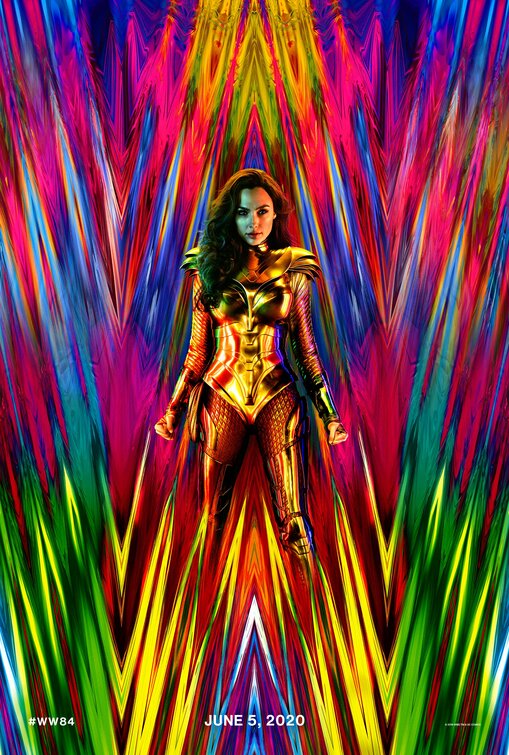“No True Hero Is Born from Lies”
What You Need To Know:
WONDER WOMAN 1984 is an exhilarating, exciting superhero movie with a lot of heart. The characters are well defined and engaging. The acting and direction are top notch. Even better, the movie stresses positive values, including Truth, Love, Kindness, and Joy, which overcome selfishness and greed for power. However, WONDER WOMAN 1984 contains brief though mostly light foul language. It also contains some Non-Christian pagan, mythological references. Finally, at one point, WONDER WOMAN 1984 suggests two couples have slept together. So, MOVIEGUIDE® advises caution for older children.
Content:
Light eclectic mixed pagan worldview with a light Romantic, idealistic, feminist outlook on humanity and its ability to learn and change, and a mixed view of the world/universe but that stresses strong positive moral, biblical values tinged with Christian, redemptive values, especially and specifically Truth, Love and Joy above all but also Patience, Diligence, Courage, and Sacrifice, and the movie’s perspective on humanity also agrees with the Christian, biblical view that human beings are terribly flawed and even sinful and thus their wishes and desires are tainted by their flaws and sins, plus some false or aberrant theology such as there’s a comment about polytheistic gods being real (Diana says “there were many gods” who used “elemental” forces or resources on Earth to create magical objects to serve one purpose or another, and there’s also a reference to a “god” who’s an evil trickster god and who created a Dream Stone that grants people’s wishes but always takes something away from them that they value), and there’s a hint of reincarnation as a man comes back to life but in another man’s body, Wonder Woman’s powers seem magical and mythological rather than based on something scientific or related to the Biblical God’s supernatural power, and at least one politically correct moment occurs when Wonder Woman grabs guns from two thieves and says, “I hate guns”
Four obscenities and four light profanities
Lots of action violence and jeopardy includes fighting between Wonder Woman and thieves, a thief threatens a child but Wonder Woman saves the child, men fire guns at Wonder Woman, Wonder Woman is nicked by a couple bullets, Wonder Woman fights female villain in two action sequences, men driving two military vehicles try to squish Wonder Woman, but she survives. Wonder Woman flips one of the military vehicles, Wonder Woman makes large leaps and jumps (sometimes using her Lasso of Truth to propel herself), Wonder Woman uses her Lasso to sweep tow children out of the way of oncoming military vehicles, Wonder Woman’s male friend helps her during some of these action sequences by fighting the men against her, a young Wonder Woman makes spectacular jumps and leaps while competing in a race with some young women, young Wonder Woman also makes a high dive into the ocean and jumps her horse across a ravine, Amazon women shoot arrows at targets, etc.
Lightly implied fornication, but no sex scenes, just a few kisses
No nudity
Light alcohol use and a drunken man bothers a woman twice
No smoking or drugs; and,
Selfishness and greed but rebuked, and a father neglects his son, but this is rebuked and overcome.
More Detail:
The movie opens with Wonder Woman remembering an incident from her childhood on the hidden Amazon island, when Diana competed in a big sporting event with young adult women. After running through a giant obstacle course like something out of TV’s AMERICAN NINJA WARRIOR, the contestants leap into the ocean and swim to a beach where horses await them. While riding the horses, they have to grab some bows and arrows and successfully hit targets that hit different colored smoke. Diana and her horse are well in the lead but Diana falls off her horse while hitting some bushy tree branches. She takes a shortcut to get back on her horse, which is still in the lead. As she enters the stadium, however, to cross the finish line, her mother pulls her away, and another young lady wins the race.
Diana doesn’t think this is fair, but her mother reminds her that she took a shortcut, and that’s cheating. “That is the truth,” her mother tells her, “and truth is all there is. No true hero is born from lies.”
Cut to 1984. Diana is enjoying her life in Washington DC, where she works as an archeology scholar at the Smithsonian Institute. Another woman working there, Barbara Minerva, envies Diana. Unlike Diana, Barbara is awkward, nerdy and has no sense of style. As a result, everyone ignores her, including the handsome young men working at the Smithsonian. Meanwhile, Diana ignores all the attention she receives from men, because, truth be told, she’s still pining for her lost love, Steve Trevor, who died fighting the Germans and the Greek God Ares with Diana during World War I. Although Barbara is awkward, nerdy and needy, Diana likes her humor, compassion and freewheeling spirit, and the two women become friends.
In the last year, Diana has been donning her Wonder Woman outfit to help people in trouble. Diana’s been avoiding the cameras all this time, so everyone is wondering who this mysterious heroine is.
One day, while Diana’s saving a couple people’s lives around the city, four thieves invade a jewelry store on the third floor of the city’s big shopping mall. In the back room, the store is actually doing a brisk black market business in stolen antiquities. Two of the thieves enter the back room and, at gunpoint, take two bags of artifacts. Leaving the store, they toss the two bags to their two confederates waiting outside. The four men separately start to walk away quickly, but one of the thieves holding a bag drops a gun. A woman shoots the gun, and everyone in the mall panics. The mall police confront the man with the gun, but he grabs a blonde girl as hostage and threatens to throw her off the railing. Diana comes to the rescue, and a big fight ensues between her and the four thieves. Naturally, Diana wins the fight and ties the thieves up for the police before she makes her own escape.
The next day or so, the FBI gives the antiquities from the store’s illegal stash to the Smithsonian Institute to identify them. They ask Barbara, who’s a gemologist and an antiquities expert, to examine a strange small artifact with two large gemstones or crystals mounted on it. Diana comes down to look at the artifact too. While there, one of the male experts touches the artifact and wishes he had a cup of coffee. Just at that moment, another man appears with coffee for him and another person.
Diana and Barbara laugh at the coincidence, but Barbara asks Diana what she would wish for if the artifact could grant her one wish. A pensive, wistful look comes over Diana’s face as she holds the artifact, and it’s clear she’s wishing that her one true love, Steve, were alive.
At about the same time, a would-be donor arrives at the Smithsonian and asks to take a look at the artifacts captured from the illegal antiquities store. The potential donor is Max Lord, the owner of an oil company called Black Gold. Lord sells membership in his company to the general public, but the truth is that none of his oil fields are producing any oil. He’s just bought up a lot of land that other companies have passed over already. Max pays lots of attention to Barbara and seems very interested in the gemstone artifact. He invites both her and Diana to a party that evening, where he will announce his big donation to the Smithsonian. Diana is skeptical. She tells Max that, in her experience, the best donors are people who promote the Smithsonian rather than themselves. Max admits she has a point, but he tells her he loves to party. Max’s answer amuses Barbara, who’s clearly seduced by Max’s charms, not to mention his optimism.
Before going to the party, Barbara takes the artifact back to her office. Touching the artifact, she wishes that she were like Diana in every way. Inspired by Max, Barbara buys a new outfit and spends some time fixing her appearance at home for the party. Sure enough, when she arrives at the party at the Smithsonian, she looks utterly charming and doesn’t act awkward at all. Suddenly, the men are noticing her just like they notice Diana.
At the party, Diana meets a tall dark man who happens to repeat some lines that Steve told her before he died. Diana, who has the lasso of truth in her possession, sees through the man’s outward appearance and recognizes her old flame.
At the same time Diana and Steve are reuniting, Max Lord and Barbara seems to become even closer at the party. Barbara takes Max to her office, where Max continues to sweep her off her feet. A big kiss results in Barbara letting Max borrow the strange artifact, which clearly has the power to grant wishes.
The next day, Diana tells Steve about the artifact’s powers. With Steve in tow, she asks Barbara to see the artifact, but Barbara confesses she gave it to Max. Meanwhile, Max decides to use his one wish. He wishes to become the wish stone itself, and the artifact immediately turns to dust. Max starts manipulating other people in his company, including a huge investor, to wish things that benefit the company. Suddenly, Max’s oil fields start producing oil. His company becomes bigger and bigger. However, his wishes start causing social and political upheavals in the world. The upheavals may be good for Max and his company, but not good for the rest of humanity.
At the same time, Diana and Barbara start to do further research on the magical artifact. It turns out the artifact supposedly was created by an evil Roman god. Steve tells them the story of the monkey’s paw, a legendary item that grants wishes, but all the wishes come at a terrible price. The legend of the artifact, called the Dream Stone, is that every civilization which uses the stone is eventually destroyed. The only way to stop the Dream Stone’s powers is to destroy it, or for people to renounce the wishes they’ve made. Barbara refuses to renounce her wish, however. She also opposes any effort by Diana or Steve to kill Max Lord.
Diana and Steve decide to find Max and confront him before he does any more damage. The problem is, the more wishes Max gets other people to make, the more powerful he becomes. To make matters even worse, because of her wish to bring back Steve, Diana’s super powers are getting weaker and weaker. The good news, however, is that the more Max uses his wish-granting powers, the worse his health is getting. Max has a plan to solve that problem, but his plan could lead to the destruction of the whole planet.
WONDER WOMAN 1984 is an exhilarating, exciting superhero movie with a lot of heart. The action scenes are thrilling and full of jeopardy. The characters are well defined and engaging. The acting and direction are first rate. Finally, the story has many heartfelt moments that will deeply touch the receptive viewer’s mind and heart.
For example, Max is not just a greedy con man who seeks wealth. He’s also an insecure man who thinks that power and success will make his young son proud of him. However, he doesn’t want to work for power and success. He thinks it can come to him merely by wishing it to be so. Thus, when he discovers that that’s not the way things work in the world, he becomes obsessed with finding and using the Dream Stone to gain power and success. Of course, it becomes clear by the end of the second act that Max’s efforts to gain power and success have led to him neglecting his own son. So, one of the big questions in the story is whether or not Max will finally realize the error of his ways.
In a similar fashion, Diana becomes trapped by her own personal desires to be with Steve, the true love who died. Thus, the question for Diana is whether she can follow the wise words of her mother long ago, “The truth is all there is. No true hero is born from lies.”
Ultimately, WONDER WOMAN 1984 is a story celebrating Truth and Love. As such, it may remind Christian viewers of 1 Corinthians 13:6 in the new testament, which says, “Love does not delight in evil but rejoices with the truth.” Other parts of the movie also may remind Christian moviegoers of other parts of Paul’s passage defining love in Chapter 13 of First Corinthians, such as “Love is patient, love is kind,” Verse Four,” and “love is not self-seeking,” Verse Five. For example, Diana’s mother mentions patience as a virtue. Also, Max is virtually destroyed by his selfishness. Finally, Barbara’s lust for strength destroys her compassion for other people. Thus, while the movie has a slightly Romantic, idealized notion of people’s capacity to learn and be reformed, it also seems to agree with the Christian, biblical view that human beings are terribly flawed and even sinful and their wishes and desires are tainted by their flaws and sins.
Even so, however, WONDER WOMAN 1984 doesn’t have a Christian view of human salvation. In fact, the dialogue contains references to polytheism. For example, at one point, in explaining the magical, supernatural, evil origins of the Dream Stone, Diana says, “There were many gods” who used “elemental” forces or resources on Earth to create magical objects to serve one purpose or another. Diana’s own super powers seem more magical and mythological rather than based on something scientific or related to the God of the Bible’s supernatural power. Ultimately, therefore, the movie sees faith and religion as a divisive force in the world. Only in so far as faith and religion follows virtues like Truth, Love, Patience, Kindness, Sacrifice, Goodness, and Joy does it have any benefit.
WONDER WOMAN 1984 also has some foul language in it. Also, it implies at one point that Diana and Steve and Barbara and Max sleep together. Finally, it has lots of thrilling action and jeopardy. So, MOVIEGUIDE® advises caution for older children.
On a side note, the United States President depicted in the movie is not an overt imitation of Ronald Reagan, but the wish he makes in the movie is superficial, silly and rather dangerous. So, the story’s subtext might be considered a slam on President Reagan. Also, Max Lord, the villain in the story, is a deceitful television personality, not just a simple con man. So, the story’s subtext may be considered some kind of slam against Donald Trump. However, Max’s son is clearly Hispanic. Also, Max is played by Pedro Pascal, the Chilean-born actor who also plays the heroic title character in Disney’s acclaimed STAR WARS series, THE MANDALORIAN. So, you can take these political conclusions only so far. In fact, if you think about it, the Democrat politician Barack Obama is just as much a TV personality as Donald Trump ever was. Ultimately, therefore, people have to ask themselves whose political policies and whose competence ability are better, not just which personality they find more appealing. As Diana’s mother says in the movie, “Truth is all there is.” People who hate Trump like to complain about the lies he allegedly tells, but it was actually Barack Obama who was found guilty of saying the biggest lie of 2010, “If you like your doctor, you can keep your doctor. And, if you like your healthcare plan, you can keep your healthcare plan.”


 - Content:
- Content: 







